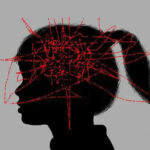
Empathy is Evolution
The brain is hardwired for survival. Our survival system of immobilization began 500 million years ago. What followed was the system wired for mobilization (400 million years ago). Finally, our social engagement system came online 200 million years ago, the part of us wired to connect with others and build empathy (Dana & Porges, 2018).
Empathy is evolution.
If you’ve ever noticed people with narcissistic tendencies (self-centeredness, inability to see things from others’ perspectives, grandiosity, difficulty in connecting to emotions, lack of empathy, chronic sense of entitlement, constantly seeking validation/admiration from others [Hamilton & Durvasula, 2016]), one could say they’ve not evolved, for a variety of reasons. Most notably when someone displays narcissistic tendencies it’s a branch of emotional immaturity. Something along the line stunted their emotional growth and development; hence, they’ve not evolved.
Empathy is a gift and a burden. We empaths feel so deeply most, if not all, of the time. It’s difficult to turn off the empathy switch. We feel each other’s pain, love, joy, fear, confusion, sadness, distress, loss, disgust, rejection, rage, and everything else on the feelings wheel. We can imagine what it might be like for someone to experience what they have experienced/are experiencing. The weight of the world feels like it rests on our shoulders.
Empathy is evolution.
Let us not confuse empathy and hyper-vigilance. Hyper-vigilance means we are on watchful guard for any disturbances in our peace/environment: searching for verbal, facial, and bodily cues of what others might be feeling to adjust ourselves accordingly. This is a survival response (the one developed 500 million years ago): fawn or appeasement or submission. The alternative to this is freeze: when we cannot appease others to protect ourselves, we “play dead”, oftentimes dissociating, meaning our minds go to a safer place because our bodies and the environment isn’t safe right now, we cannot ward off the threat, and we are not equipped to handle it.
Empathy is evolution.
400 million years ago, our nervous systems developed the fight or flight skills necessary to continue to survive. Now, we can fight back or run away when a threat is too much. Having these options, our bodies do what they feel is best to do moment to moment in the face of threats. It’s not for another 200 million years that we gain the ability to be communal and find opportunities to quell our system to be socially engaged. 200 million years ago, social engagement became a survival response. We needed to be able to rely on others for food, housing, child-rearing, caretaking, and protection (Castelloe, 2016). And now, in a world where we use all these survival skills, empathy is evolution.
Let’s look a little closer at the brain: the first part to develop is the brain stem (primitive brain) and the midbrain, controlling our survival and automatic processes; this is followed by the process of myelination which aids as a protective factor for the brain cells. Next, through experiences and growth, the brain develops rapidly in the first few years of life. The midbrain and limbic system continue to develop, aiding in attachment and emotional development. As we enter adolescence, we encounter a growth spurt in the frontal lobe, the area of the brain responsible for logical thinking: planning, reasoning, and impulse control. The greatest difference in the brain between adolescence and young adulthood is the amount of myelination that occurs; we have more myelination as we grow into our 20s and 30s, rendering us more able to have foresight, greater impulse control, and think more logically (Ayre & Krishnamoorthy, 2020).
Through mirror neurons (the parts of the brain that act as “monkey see, monkey do”), we take in more of the world: through actions, body language, vocal tones, facial expressions, experiential learning. As we grow, we become more capable of various experiences, our own and others. Consider this TED Talk by Jeremy Rifkin.
If you have empathy, consider yourself a superhero with a superpower. Where we go next in evolution, I believe those of us with empathy will reign. Our next steps will require us to feel deeply and commune with others. Yes, artificial intelligence may be on the horizon as part of our future, and it will not be the entirety of our future. If you look at society as it stands right now, there are many elements of brokenness; however, there is so much beauty and empathy beginning to circulate: we feel for our fellow brothers and sisters in the Middle East, in Ukraine, in Haiti, in Africa. Our parenting/childrearing practices are changing and evolving into a more conscious and humanlike way of being. Our students are protesting the atrocities against other humans by other humans and our governments in our home countries and afar. We are being asked to care through social media and the internet about all the world’s hardships: global warming, assaults, technology, wars, political movements, etc., and we are. We band together as a people for civil rights, human rights, farmers’ rights, women’s rights, animal rights, and the like. This is empathy. This is the beginning of something new.
If you feel less empathically inclined, know you are not lost. This is where some beautiful work can be done. It will take holding up the mirror to yourself, getting in touch with your deepest parts, and asking you to dive in the depths with others. Sit in their pain. Witness their hardships. Cry with them. Celebrate their successes.
Empathy is evolution. Empathy is revolution.
References
Ayre, K., & Krishnamoorthy, G. (2020, November 25). How the Brain develops. Trauma Informed Behaviour Support a Practical Guide to Developing Resilient Learners. https://usq.pressbooks.pub/traumainformedpractice/chapter/3-1-how-the-brain-develops/
Castelloe, M. (2016). The evolutionary origins of empathy. Psychology Today. https://www.psychologytoday.com/us/blog/the-me-in-we/201612/the-evolutionary-origins-empathy
Dana, D., & Porges, S. W. (2018). The Polyvagal Theory in Therapy: Engaging the Rhythm of Regulation. New York: W. W. Norton & Co Inc.
Hamilton, A., & Durvasula, R. (2016). Recognizing a narcissist, with Ramani Durvasula, Phd. American Psychological Association. https://www.apa.org/news/podcasts/speaking-of-psychology/narcissism
Priztker, J. B. (2023). Empathy & Compassion are evolved states of being. Word on the Streets. https://www.wordonthestreets.net/Articles/667081/Empathy_compassion_are.aspx
Rifkin, J. (2010). The empathic civilization. Jeremy Rifkin: The empathic civilization | TED Talk. https://www.ted.com/talks/jeremy_rifkin_the_empathic_civilization



